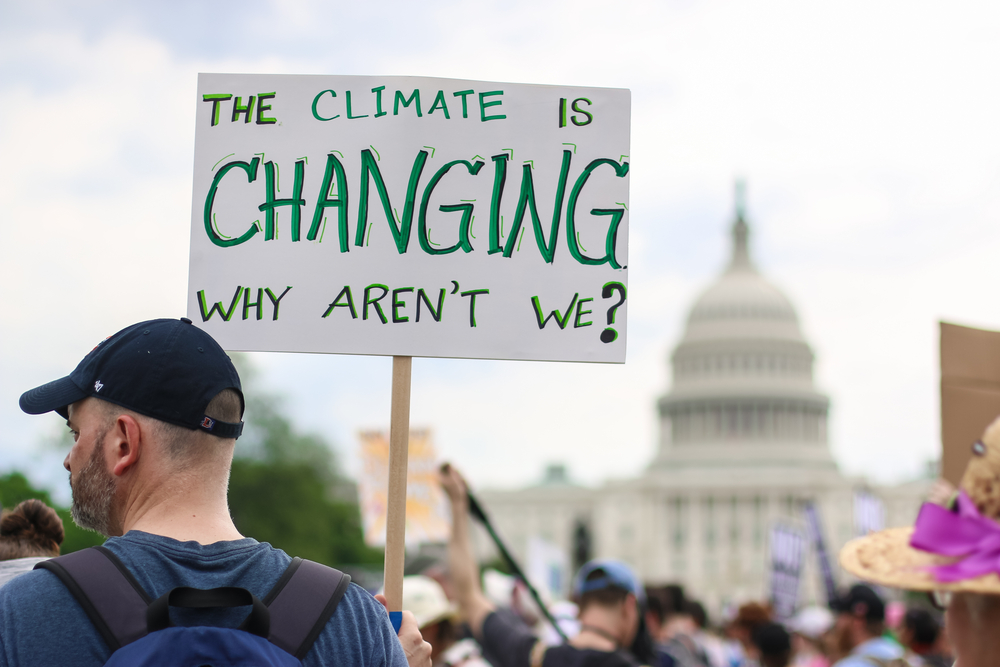Concerned with climate change? What we can do

Nicole S Glass / Shutterstock.com
Concern over the climate issue is at an all-time high among Americans.
A Yale University poll found that six out of ten Americans (59%) are either scared or concerned. Finding effective solutions to that issue, however, might be challenging. Understanding the nature of the issue at hand is the first and most important step in figuring out how to address it. Understanding the climate crisis in this scenario leads to two crucial areas for action. The first is to actively participate in decarbonizing our daily activities, as well as those of our homes, workplaces, and modes of transportation. The second is to promote government accountability for polluters.
Think on the big picture. Fossil fuels are basically what power our world (coal, oil and methane gas). They are extracted from the ground and burned to produce energy, heat and cool buildings, and power vehicles such as cars, trucks, and airplanes. For decades, fossil fuel companies — utilizing their vast financial and political influence — have been able to push the costs of their pollution onto the public. Currently, more than 8 million people die from air pollution-related causes worldwide each year. Heat waves, rising sea levels, protracted droughts, devastating wildfires, and other extreme weather phenomena linked to climate change are predicted to cost the public trillions of dollars.
That would be a different story if fossil fuels were our only source of energy, but they aren’t. These can be easily replaced with clean, renewable energy sources. In many regions, solar and wind energy are already more affordable. In addition, the Intergovernmental Panel on Climate Change (IPCC) of the United Nations has found that the only major barriers to reducing climate change are politics and the interests of fossil fuel companies. The difficulty lies in figuring out how to switch from fossil fuels to clean energy at the necessary rate and scale while also safeguarding low- and middle-income households.
Decisions we make at the dinner table can start the decarbonization process. Our dwellings resemble miniature fossil fuel plants, if you think about it. To heat and cool our buildings, as well as to heat water, dry clothing, and cook food, we consume polluting fuels (oil, gas, or coal). To power our cars, the majority of us use gasoline. By deciding to electrify as much as we can, we can change this.
Prior to recently, customers didn’t have many incentives to switch from fossil fuels, but that has changed as renewable energy sources have become more affordable and the Inflation Reduction Act has made billions of dollars in subsidies and refunds available. Making the switch from gas to battery electric vehicles (EV), from oil or gas furnaces to electric heat pumps, and from gas water heaters, stoves, and clothes dryers to electric ones has never been simpler. Families may now qualify for refunds worth thousands of dollars, which may result in a $1,800 annual electricity bill savings. These actions save money while improving our health and the health of our communities.
Sadly, despite how significant these initiatives are, they won’t be sufficient to achieve our climate targets. We must reduce emissions by half by 2030, according to the IPCC, to prevent catastrophic and irreversible effects. We are fighting a lost war if fossil fuel companies are permitted to keep upping their production and making money from their dirty fuels. We must lobby governments to phase out these harmful fuels quickly and move toward a future powered by sustainable energy.
Because this sector is perhaps the most powerful economically and politically on the planet, the shift won’t be simple. They have effectively utilized their influence to stop or postpone governmental actions that would upset their evil business strategy. They made plain their intention to increase oil and gas production during the Houston, Texas, annual energy conference in 2023. “Our objective is to stay as oily as we can for as long as we can,” one CEO said.
Government action will be needed on a number of fronts, including the elimination of subsidies, limiting upcoming extractions, accelerating renewable energy approvals, as well as raising investments in thriving forests and environmentally friendly agriculture. But, one course of action sticks out. A carbon tax, according to thousands of well-known economists, “provides the most cost-effective lever to cut carbon emissions at the scale and speed that is essential.” It permeates the entire economy, giving everyone who makes decisions (governments, enterprises, and consumers) an incentive to look for methods to cut emissions. The industry’s political and financial influence is waning as demand for fossil fuels drops. In the United States and around the world, policies that incorporate a carbon charge, cash-back dividend, and a border carbon adjustment are gaining favor. Around ten legislation relating to carbon pricing have recently been submitted to Congress. They require our help.
From alarm to action, we can move. We will minimize emissions and participate in the “grand implementation” of clean energy if we decide to decarbonize by switching to electric-powered appliances and autos. Meanwhile, exerting pressure on our elected officials can result in legislation that gradually phased out fossil fuels by making polluters pay, using the money to help households through the transition, and achieving a global solution by incentivizing all our trading partners, including China, to adopt similar policies.










